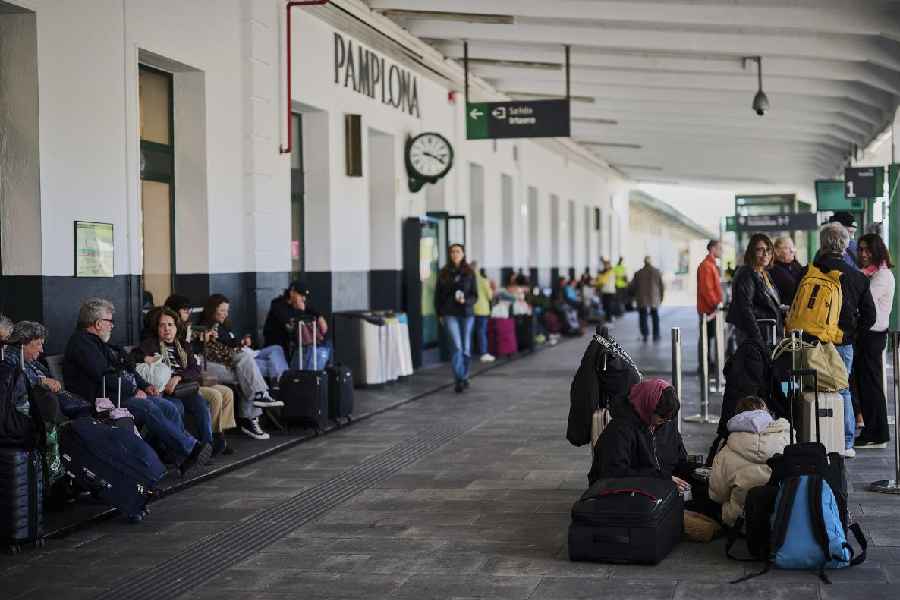A massive power outage that disrupted Spain and Portugal on Monday continues to cause widespread issues, with authorities working to restore electricity.
Spanish power distributor Red Eléctrica has announced that full recovery may take between 6 to 10 hours, but the cause of the blackout remains unclear.
The outage, described by Red Eléctrica's head of operations Eduardo Prieto as "exceptional and extraordinary," knocked out subway networks, traffic lights, ATMs, hospitals, and even major airports in both Spain and Portugal.
The company declined to speculate on the cause, but said that work was underway to restore the grid.
Portugal’s government indicated the source of the blackout appeared to originate in Spain. "It looks like it was a problem with the distribution network, apparently in Spain. It's still being ascertained," cabinet minister Leitão Amaro told national news agency Lusa.
Portuguese distributor E-Redes said the issue related to a broader problem in the European electricity system, as reported by Expresso.
Severe disruption across services
The blackout triggered widespread disruption. In Spain, Madrid’s Barajas International Airport was closed, while metro stations in Madrid and Barcelona were evacuated.
Video footage aired by Spanish television showed people exiting underground stations and trains halted mid-transit.
Spain’s parliament, the RTVE newsroom, and other key institutions were also left without power.
A graph from Red Eléctrica's website indicated a dramatic drop in electricity demand from 27,500MW to 15,000MW around 12:15pm local time.
Madrid Open tennis tournament play was suspended when the blackout hit. Grigor Dimitrov's match against Britain's Jacob Fearnley was stopped with the Bulgarian leading 6-4, 5-4, after the spidercam and electronic line-calling systems failed. Fourth seed Coco Gauff’s post-match interview was cut short at the Arantxa Sanchez Stadium as microphones lost power.
ATP confirmed that two singles matches and one doubles match were underway when power went down at 12:34pm local time.
Spectators shared images of darkened hallways at the Manzanares Park Tennis Center.
Spain’s traffic department urged citizens to avoid using cars, citing widespread failure of traffic lights and road signage. In Terrassa, an industrial town 50km from Barcelona, stores selling generators were reportedly out of stock amid high demand.
Emergency responses in Portugal and Spain
In Portugal, the blackout affected Lisbon, its surrounding areas, and the north and south of the country. Public transport, including metro systems, was hit.
Portuguese police increased deployments to manage traffic chaos and emergency calls. Several courts halted proceedings, hospitals switched to backup generators, and gas stations, ATMs, and electronic payment systems stopped working.
Lisbon's Humberto Delgado Airport also faced closure, while mobile phone services were widely disrupted. Authorities urged citizens to avoid unnecessary calls to emergency numbers to keep lines open for genuine cases.
The Portuguese National Authority for Emergencies and Civil Protection reported that backup systems in critical services remained operational.
Spain’s National Security Council convened to coordinate the response, according to Cadena SER Radio. Spanish Prime Minister Pedro Sánchez visited Red Eléctrica’s control centre to monitor efforts to restore power.
Investigations underway; cyberattack not ruled out
Authorities in both Spain and Portugal said the exact cause remained unclear. Portugal’s National Cybersecurity Centre (CNCS) stated there was no current evidence of a cyberattack, although cyber sabotage had not been ruled out. Spain’s National Intelligence Centre is also investigating potential links to cyber threats.
Portuguese energy company REN pointed to a fire in the south-west of France, on the Alaric mountain, which damaged a high-voltage line between Perpignan and Narbonne, as a possible contributing factor.
Residents in Andorra and parts of France bordering Spain also reported outages. According to Euronews, some disruptions were felt as far as Belgium, though France's national grid operator RTE confirmed power had been restored and efforts were ongoing to assist Spain’s recovery.
Endesa and Iberdrola, Spain’s major electric companies, are conducting parallel investigations. Domestic media reported that issues with the European electric grid affected national grids in Spain and Portugal.
Taco Engelaar, managing director at energy infrastructure experts Neara, told Euronews that a physical fault or a cyberattack could explain the scale of the outage, pointing out that interconnectivity between national grids could magnify the impact.
European Union offers support
The European Commission issued a statement confirming contact with national authorities in Spain and Portugal as well as with ENTSO-E, the European transmission system operators' network. European Commissioner for Energy and Housing, Dan Jørgensen, posted on X, offering EU support and praising efforts already underway to restore the grids.
"Power is already back in some regions. Network operators and ENTSO-E are doing everything possible on the ground. Solidarity and unity are key for our Energy Union," Jørgensen said.
By late Monday afternoon, Red Eléctrica said it had begun restoring supply in both northern and southern Spain. Nevertheless, the full restoration process could take between six and ten hours due to technical constraints.
The blackout affected a region with a combined population of over 50 million people — a rare event on such a scale across the Iberian Peninsula.










